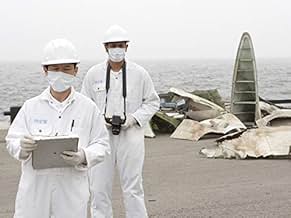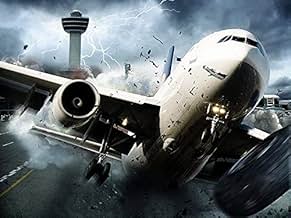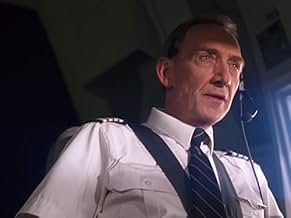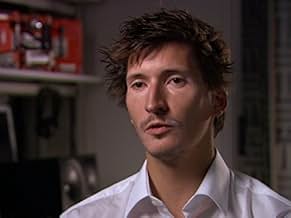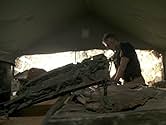Reconstrução dramatizada de desastres aéreos da vida real, com entrevistas a especialistas em aviação e testemunhas oculares.Reconstrução dramatizada de desastres aéreos da vida real, com entrevistas a especialistas em aviação e testemunhas oculares.Reconstrução dramatizada de desastres aéreos da vida real, com entrevistas a especialistas em aviação e testemunhas oculares.
- Prêmios
- 3 vitórias e 6 indicações no total
Explorar episódios
Avaliações em destaque
Real investigations, beautiful shots that reconstruct the events that really happened. Really well done program both for the experts and for the testimonies that speak of the various plane crashes.
This is a great show which besides some of the mediocre re-enacting, is almost perfectly presented. I only have a couple real complaints about it. If anything I wish that "ACI" covered even more about the investigations as they can sometimes go on for years. I would think that being a NTSB investigator would be an amazing job although it's sad it has to come to that. It must be very rewarding for those trying to figure out what went wrong & explaining to those who both survived, & to those that have lost loved ones exactly what happened. This is one of those shows that has stories that are absolutely astounding that cannot be made up, otherwise you wouldn't believe it. (The pilot outside, Air France hostages, Hawaiian airlines losing their top, the mid-air collision etc.) I would hate to wish for more accidents to happen, but unfortunately that is the only way for us to learn about them and make them safer. I know it's all about money, but why every system doesn't have at least 1 redundancy (2 for the major systems such as the hydraulics) built in, is beyond me. You can't put a price on these people yet we do it every day. Anyway love this show & for anybody trying to expand their knowledge as well as being entertained, this is the show for you.
I like this series. Being a pilot, I'm aware of when an aviation related program is nonsense or not, and most of the facts presented in this program are fairly accurate. It's a relief that it isn't all nonsense.
The facts seem to be presented in such a way that the average non-pilot can understand what happened.
Seeing this program makes you want to stay home and not travel, although statistically speaking, if one must travel, air travel is the safest way to go, with the exception (in North America) of the train.
One episode you'll want to avoid is 'Blow Out', unless you want a headache. It's an hour of mostly camera shaking, when it is unwarranted.
The facts seem to be presented in such a way that the average non-pilot can understand what happened.
Seeing this program makes you want to stay home and not travel, although statistically speaking, if one must travel, air travel is the safest way to go, with the exception (in North America) of the train.
One episode you'll want to avoid is 'Blow Out', unless you want a headache. It's an hour of mostly camera shaking, when it is unwarranted.
Most of us have flown, and have heard of those horrible airplane crashes that used to make big splashy news' headlines. They don't happen quite as often as they used to, and in our day and age of information overload, they tend to get drowned out with all the other news around the world. But, they still occasionally occur, and still draw attention.
This show, "Air Crash Investigations", "May Day", or "Air Emergency", or whatever you want to call it, delves deep into the causes and effects of many a famous air liner disaster. And, amazingly enough, despite the theatrics in the recreations, educates the viewer as to the realities of air craft functions and procedures of operation. By the end of the episode you'll feel like an aerospace engineering expert.
The format of the episodes follow a presentation of the event in brief, then an elongated version showing the developments to the event, followed by investigation and analysis. Nearly every episode has an act four that tells of the aftermath's, good and bad, of the disaster or crash that was investigated. All the while you, the viewer, are given great insight into the short comings of procedure, design or environment--more often than not it will be a combination of these factors that will lead to the inevitable; a crash of some form.
Not every episode deals with a crash landing. Sometimes the crew is able to salvage mortal failure on part of the plane, and bring things to a safe end--or, more often than not, a relative safe end. Even when the pilots can bring back a wounded bird so the show still looks into what forced the pilots into that situation, and how the event culminated in its eventful end.
One of the amazing things about this show is that the engineering aspects are explained such that any lay person, anyone who doesn't have any kind of engineering nor scientific background, are brought up to speed on the mechanics and science behind aircraft design so that they can understand, for the duration of the episode, the engineering aspects that were involved. Similarly procedures are explained as to how jets are flown, how they are berthed, how they land, takeoff, and are maintained. Interviews with key players, witnesses, experts in the field, make clear along with charts, animations and recreations provide visual cues to further explain and educate.
As a casual viewer who's flown, but flies no more, I have a curiosity about some crashes here in the United States. The series explored and explained them. I also had a curiosity about the reputation of the DC- 10 during the 70s, and the series looked into that aircraft in a series of episodes as well. All the major crashes are examined; from the bombing of Pan Am over Lockerbie Scotland, to PSA Flight 182 in San Diego, to the more contemporary events such as British Airways flight 38 in Heathrowe.
If this series has a shortcoming it's not that it caters to sensationalism (it uses that as a hook, but this is not the focus of the series), it's the actors in the recreations. It's a double edged sword with the performances because the actors needed to convey the emotional atmosphere of the participants involved, and therefore by necessity ham up the effort. It makes for an unusual viewing experience, but again gives the viewer a concept of the events and the actions of the people involved.
Well, just as car wrecks create rubber-neckers, so it is that I found this show addicting. Again, in spite of its sensationalist promotion, it is an actual documentary with elements of recreated drama interspersed between interviews and explanations. Married to it is a kind of tension that holds the show together and keeps the viewer riveted. You already know what happens, but the show is going to show you why it happened, and, hopefully, what solutions resulted from these horrible events.
It's not a show for the squeamish nor emotional. You might find yourself tearing up, being shocked, maybe outraged, but not very often will you feel settled after viewing this show.
I do recommend it, but definitely watch at your risk.
This show, "Air Crash Investigations", "May Day", or "Air Emergency", or whatever you want to call it, delves deep into the causes and effects of many a famous air liner disaster. And, amazingly enough, despite the theatrics in the recreations, educates the viewer as to the realities of air craft functions and procedures of operation. By the end of the episode you'll feel like an aerospace engineering expert.
The format of the episodes follow a presentation of the event in brief, then an elongated version showing the developments to the event, followed by investigation and analysis. Nearly every episode has an act four that tells of the aftermath's, good and bad, of the disaster or crash that was investigated. All the while you, the viewer, are given great insight into the short comings of procedure, design or environment--more often than not it will be a combination of these factors that will lead to the inevitable; a crash of some form.
Not every episode deals with a crash landing. Sometimes the crew is able to salvage mortal failure on part of the plane, and bring things to a safe end--or, more often than not, a relative safe end. Even when the pilots can bring back a wounded bird so the show still looks into what forced the pilots into that situation, and how the event culminated in its eventful end.
One of the amazing things about this show is that the engineering aspects are explained such that any lay person, anyone who doesn't have any kind of engineering nor scientific background, are brought up to speed on the mechanics and science behind aircraft design so that they can understand, for the duration of the episode, the engineering aspects that were involved. Similarly procedures are explained as to how jets are flown, how they are berthed, how they land, takeoff, and are maintained. Interviews with key players, witnesses, experts in the field, make clear along with charts, animations and recreations provide visual cues to further explain and educate.
As a casual viewer who's flown, but flies no more, I have a curiosity about some crashes here in the United States. The series explored and explained them. I also had a curiosity about the reputation of the DC- 10 during the 70s, and the series looked into that aircraft in a series of episodes as well. All the major crashes are examined; from the bombing of Pan Am over Lockerbie Scotland, to PSA Flight 182 in San Diego, to the more contemporary events such as British Airways flight 38 in Heathrowe.
If this series has a shortcoming it's not that it caters to sensationalism (it uses that as a hook, but this is not the focus of the series), it's the actors in the recreations. It's a double edged sword with the performances because the actors needed to convey the emotional atmosphere of the participants involved, and therefore by necessity ham up the effort. It makes for an unusual viewing experience, but again gives the viewer a concept of the events and the actions of the people involved.
Well, just as car wrecks create rubber-neckers, so it is that I found this show addicting. Again, in spite of its sensationalist promotion, it is an actual documentary with elements of recreated drama interspersed between interviews and explanations. Married to it is a kind of tension that holds the show together and keeps the viewer riveted. You already know what happens, but the show is going to show you why it happened, and, hopefully, what solutions resulted from these horrible events.
It's not a show for the squeamish nor emotional. You might find yourself tearing up, being shocked, maybe outraged, but not very often will you feel settled after viewing this show.
I do recommend it, but definitely watch at your risk.
I'm an aviation enthusiast and a big fan of this show, presented in Brazil by National Geographic and called "Mayday Desastres Aéreos" (something like "Mayday Air Disasters)".
It's presented in a very easy way to understand so everybody can watch and enjoy it.
One my my favorite episodes is the "Blow Out", that's the first episode of the second season. It's really amazing the pilot survived.
The computer graphics is a must and recreates the aircraft models and situations with accuracy.
The actors dramatization are not bad, but it seems to be overused sometimes.
It's presented in a very easy way to understand so everybody can watch and enjoy it.
One my my favorite episodes is the "Blow Out", that's the first episode of the second season. It's really amazing the pilot survived.
The computer graphics is a must and recreates the aircraft models and situations with accuracy.
The actors dramatization are not bad, but it seems to be overused sometimes.
Você sabia?
- CuriosidadesThis show is known as Air Disasters in the USA and Mayday in Canada but is called Air Crash Investigation in Australia and parts of Europe. The Narrators are different in the various versions.
- Versões alternativasThe French-Canadian version, "Danger dans les airs", features actor (and weekend bush pilot) Gaston Lepage as the narrator, but also as the host, appearing on screen before and after the film, and before commercial breaks.
- ConexõesFeatured in Screenwipe: Episode #1.3 (2006)
Principais escolhas
Faça login para avaliar e ver a lista de recomendações personalizadas
- How many seasons does Air Crash Investigation have?Fornecido pela Alexa
Detalhes
- Data de lançamento
- País de origem
- Idiomas
- Também conhecido como
- Air Crash Investigation
- Locações de filme
- Empresas de produção
- Consulte mais créditos da empresa na IMDbPro
Contribua para esta página
Sugerir uma alteração ou adicionar conteúdo ausente

Principal brecha
What was the official certification given to Mayday! Desastres Aéreos (2003) in Canada?
Responda

